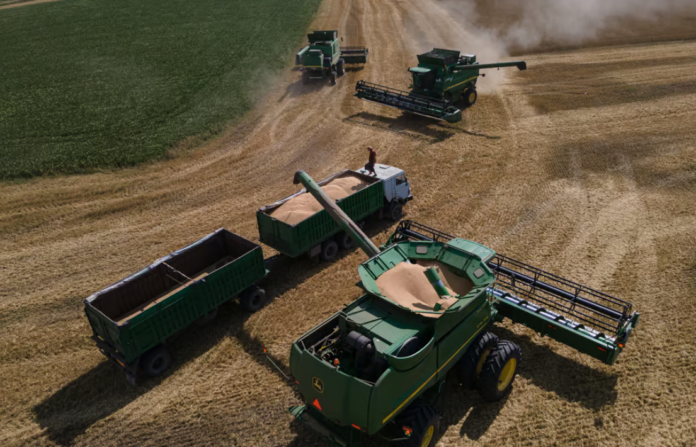European Union politicians and officials have rounded on the front-line Eastern states of Poland, Hungary and Slovakia for imposing import bans on Ukrainian farm produce, denouncing the curbs as illegal and counterproductive, according to Politico.
The three countries banned imports of Ukrainian grain and other food products over recent days, arguing the export surplus had flooded their markets and threatened the livelihoods of local farmers.
The curbs have set the group on a collision course with Brussels while at the same time threatening the EU’s fragile solidarity in backing Ukraine’s fightback against Russia’s war of aggression.
EU diplomats believe the import bans contravene both international and EU law — and will fail to achieve their goals.
“Unilateral bans of individual countries won’t solve anything,” Czech Minister of Agriculture Zdeněk Nekula said.
“We must find agreement throughout the EU on the rules under which agricultural commodities will transit from Ukraine to European ports, and that production from them goes further to countries outside the EU that are dependent on Ukrainian production.”
The issue risks turning into a ticking time bomb.
Ukraine’s economy heavily relies on grain exports, which before the war were enough to feed 400 million people. When Russia invaded last year and blocked much of Ukraine’s global exports, the EU quickly installed so-called “solidarity lanes,” dropping all inspections on imports.
As a result, grain imports into surrounding countries shot up — much to the anger of local farmers who say they can’t compete. Instead of transiting through the countries to the rest of the world, the grain stays on the local markets, the countries argue.
With the summer harvest season ahead, the situation might get even tenser. Both Poland and Slovakia are heading into national elections later this year where the rural vote will be crucial.
“Solidarity lanes aren’t working. We have no effective tools controlling the transit,” Poland’s Ambassador to the EU Andrzej Sadoś told POLITICO. “We have in our silos some 4 million tons of Ukrainian grain and we need some time to stabilize the situation.”
The problems had been largely ignored by the European Commission so far, he said, forcing the Polish government to act.
One EU diplomat accused Warsaw of indulging in “gesture politics.”
“The situation has come to a head, it wants to send a signal that it’s supporting its farmers,” this diplomat said. “But it’s really not the most elegant solution, especially with regards to solidarity for Ukraine.”
In public, the EU’s executive branch, the Commission, has taken a measured approach, telling journalists in Brussels on Monday that “at this stage, it’s too early” to give a definite answer on the legality of the move. It did, however, note: “Trade policy is of EU exclusive competence and, therefore, unilateral actions are not acceptable.”
The terms of EU-Ukraine commerce are also supposed to be safeguarded by the terms of a free trade area applied since 2014.
Slovakia argues it was forced to act on Monday after Poland and Hungary moved at the weekend to block imports.
“There was a risk their routes will redirect towards us and will cause even more pressure on our small domestic market,” a Slovak official said, adding that tests had also shown an excessive level of pesticides in wheat.
Contrary to Poland and Hungary, Slovakia said it would keep transit open.


